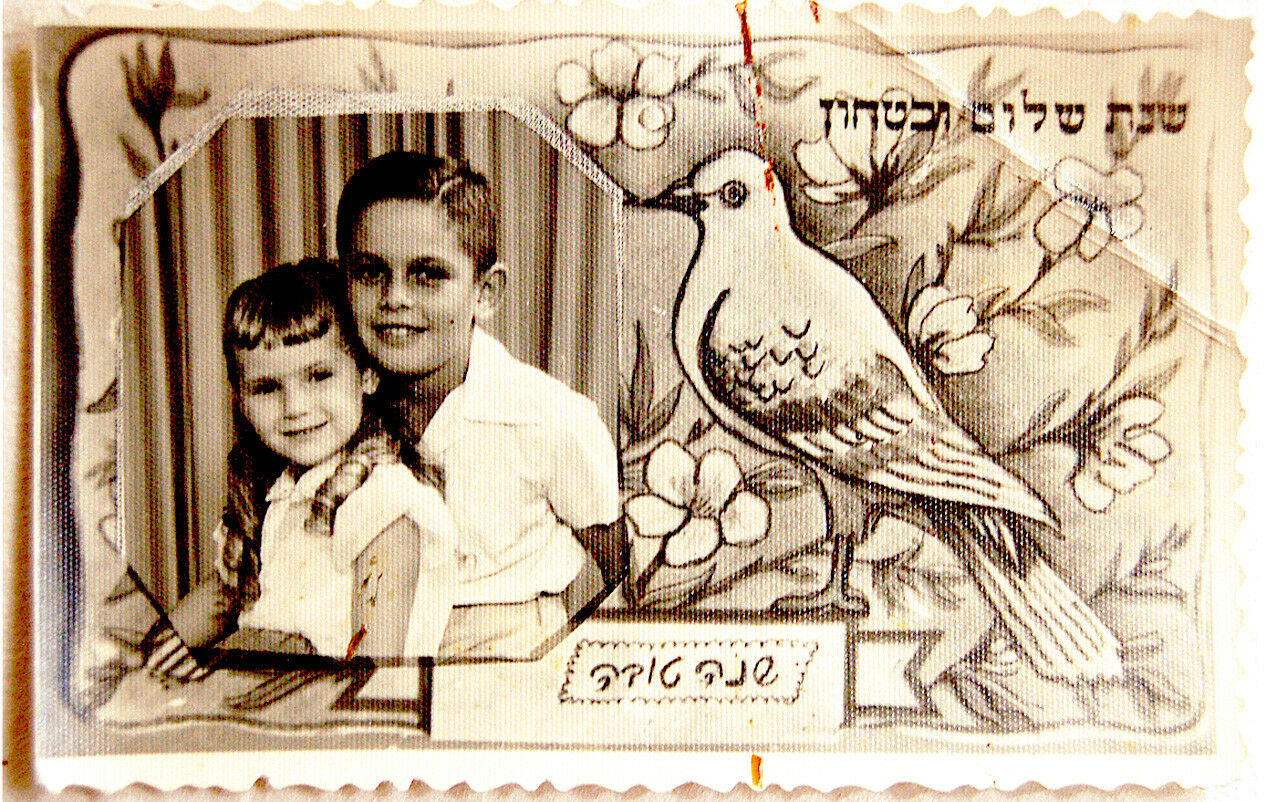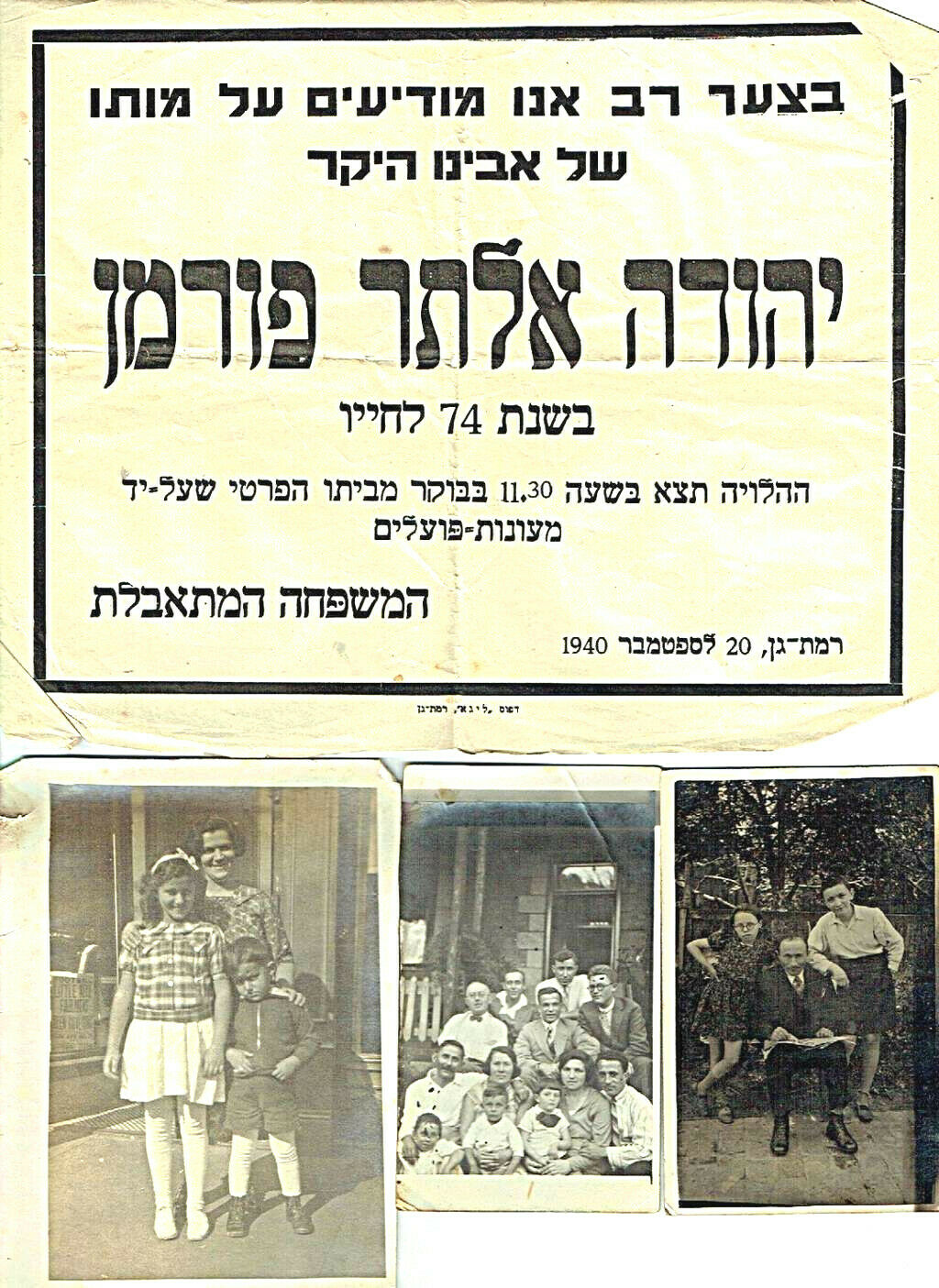-40%
1950 Judaica SHANA TOVA Photo HEBREW CARD Jewish ISRAEL Children PEACE DOVE
$ 21.12
- Description
- Size Guide
Description
DESCRIPTION: Up for auction is an original Ca late 1940's - early 1960's Eretz Israel photographed SHANA TOVA greeting CARD . ( New year greeting card ) . Depicting a pair of Eretz Israeli children , An Israeli boy and an Israeli girl on the background of a decorated scenery with a PEACE DOVE-PIGEON and the text " SHANA TOVA - A YEAR OF PEACE and SECURITY" , Very typical to the first years of the newly born INDEPENDENT STATE of ISRAEL. An original silver gelatine photo ( Not a printed postcardcard ) . Around 2.0 x 3.5 ". Very good condition. Used. ( Pls look at scan for accurate AS IS images ) Card will be sent inside a protective packaging .
PAYMENTS
:
P
ayment method accepted : Paypal .
SHIPPMENT
:
Shipp worldwide via registered airmail is $ 19 .
C
ard will be sent inside a protective packaging .
Will be sent around 5 days after payment .
The widespread custom of sending Jewish New Year's cards dates to the Middle Ages, thus predating by centuries Christian New Year's cards, popular in Europe and the United States only since the 19 century. The custom is first mentioned in the Book of Customs of Rabbi Jacob, son of Moses *Moellin (1360–1427), the spiritual leader of German Jewry in the 14 century (Minhagei Maharil, first ed. Sabionetta, 1556). Based on the familiar talmudic dictum in tractate Rosh ha-Shanah 16b concerning the "setting down" of one's fate in one of the three Heavenly books that are opened on the Jewish New Year, the Maharil and other German rabbis recommended that letters sent during the month of Elul should open with the blessing "May you be inscribed and sealed for a good year." Outside of Germany and Austria, other Jewish communities, such as the Sephardi and Oriental Jews, only adopted this custom in recent generations. The German-Jewish custom reached widespread popularity with the invention – in Vienna, 1869 – of the postal card. The peak period of the illustrated postcard, called in the literature "The Postal Card Craze" (1898–1918), also marks the flourishing of the Jewish New Year's card, produced in three major centers: Germany, Poland, and the U.S. (chiefly in New York). The German cards are frequently illustrated with biblical themes. The makers of Jewish cards in Warsaw, on the other hand, preferred to depict the religious life of East European Jewry in a nostalgic manner. Though the images on their cards were often theatrically staged in a studio with amateur actors, they preserve views and customs lost in the Holocaust. The mass immigration of the Jews from Eastern Europe to the United States in the first decades of the 20 century gave a new boost to the production of the cards. Some depicted America as the new homeland, opening her arms to the new immigrants, others emphasized Zionist ideology and depicted contemporary views of Ereẓ Israel. The Jews of 19 c. Ereẓ Israel ("the old yishuv"), even prior to the invention of the postal card, sent tablets of varying sizes with wishes and images for the New Year, often sent abroad for fundraising purposes. These tablets depicted the "Four Holy Cities" as well as holy sites in and around Jerusalem. A popular biblical motif was the Binding of Isaac, often taking place against the background of the Temple Mount and accompanied by the appropriate prayer for Rosh ha-Shanah. Also common were views of the yeshivot or buildings of the organizations which produced these tablets. In the 1920s and 1930s the cards highlighted the acquisition of the land and the toil on it as well as "secular" views of the proud new pioneers. Not only did this basically religious custom continue and become more popular, but the new cards attest to a burst of creativity and originality on the subject matter as well as in design and the selection of accompanying text. Over the years, since the establishment of the State of Israel, the custom has continued to flourish, with the scenes and wishes on the cards developing as social needs and situations changed. The last two decades of the 20 century have seen a decline in the mailing of New Year's cards in Israel, superseded by phone calls or internet messages. In other countries, especially the U.S., cards with traditional symbols are still commonly sent by mail, more elaborately designed than in the past. Thus, the simple and naïve New Year's card vividly reflects the dramatic changes in the life of the Jewish people over the last generations
Yom Ha'atzmaut (Hebrew:
יום העצמאות
Yōm hā-ʿAṣmāʾūṯ
lit. "Independence Day") is the national day of Israel, commemorating the Israeli Declaration of Independence in 1948. It is celebrated on 5th of Iyar according to the Hebrew calendar. Yom Ha'atzmaut is preceded by Yom Hazikaron, the Israeli Fallen Soldiers and Victims of Terrorism Remembrance Day Yom Ha'atzmaut centres around the declaration of the establishment of the State of Israel by The Jewish Leadership led by future Prime Minister, David Ben-Gurion, on 14 May 1948. This was declared eight (8) hours before the end of the British Mandate of Palestine, which was due to finish on 15 May 1948. The operative paragraph of the
Declaration of the Establishment of State of Israel
of 14 May 1948 expresses the declaration to be
by virtue of our natural and historic right and on the strength of the resolution of the United Nations General Assembly
. The operative paragraph concludes with the words of Ben-Gurion, where he thereby declares
the establishment of a Jewish state in Eretz Israel, to be known as the State of Israel
. The new state was quickly recognised by the Soviet Union, the United States
de facto
,and many other countries, but not by the surrounding Arab states, which marched with their troops into the area of the former British Mandate.Most of the official events take place in Israel's capital city Jerusalem, and are broadcast live on television.
Yom Ha'atzmaut eveAn official ceremony is held every year on
Mount Herzl, Jerusalem on the evening of
Yom Ha'atzmaut
. The ceremony includes a speech by the speaker of the Knesset (the Israeli Parliament), artistic performances, a Flag of Israel, forming elaborate structures (such as a Menorah, Magen David) and the ceremonial lighting of twelve torches, one for each of the Tribes of Israel. Every year a dozen Israeli citizens, who made a significant social contribution in a selected area, are invited to light the torches. Many cities hold outdoor performances in cities' squares featuring leading Israeli singers and fireworks displays. Streets around the squares are closed to cars, allowing people to sing and dance in the streets.
Yom Ha'atzmaut day
Reception of the President of Israel for honouring excellence in 120 IDF soldiers. The event takes place in the President's official residence in Jerusalem.International Bible Contest in Jerusalem Israel Prize ceremony in Jerusalem Israel Defense Forces opens some of its bases to the public. Israel Defense Forces parade (1948–1973) Hebrew Song Contest (1960–1980) Israeli families, regardless of religious observance or affiliation, celebrate with picnics and barbecues (known in Israeli slang as a
mangal
– from the Arabic word
منقل
meaning "stove"). Balconies are decorated with Israeli flags, and small flags are attached to car windows. Some leave the flags hoisted until after Yom Yerushalayim. Israeli Television channels air the official events live, and classic cult Israeli movies and skits are shown. ebay3542












